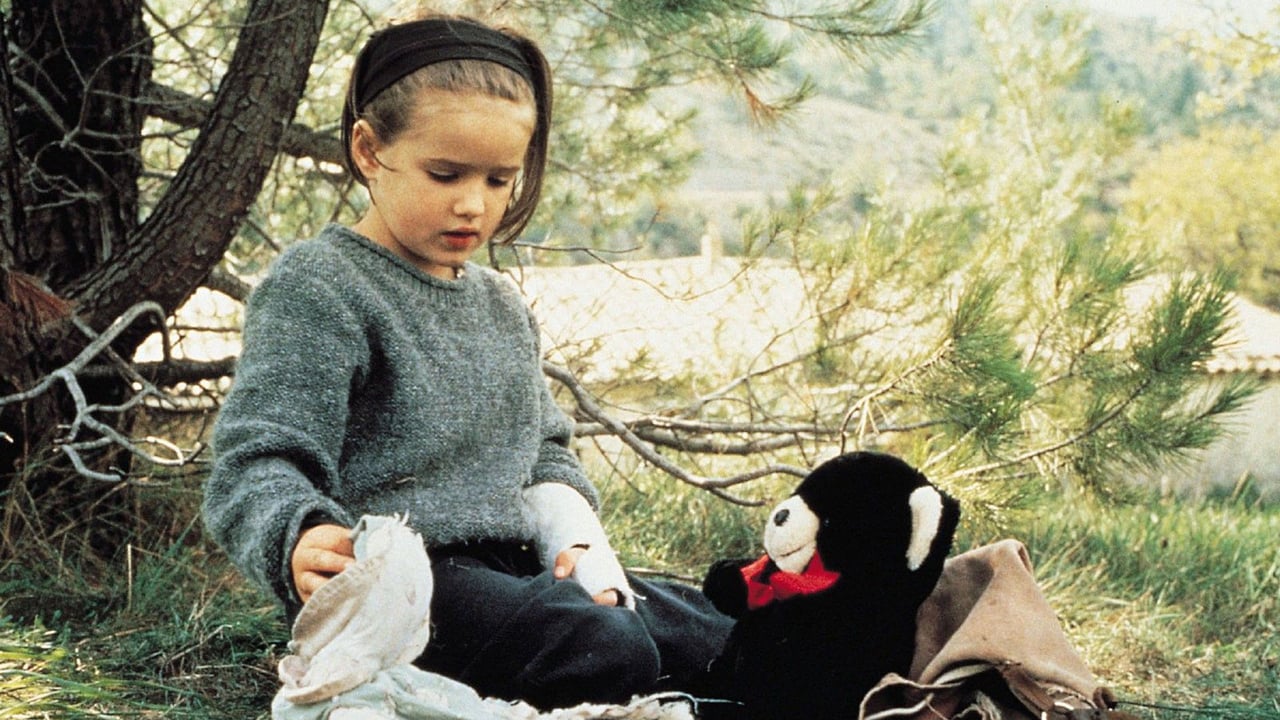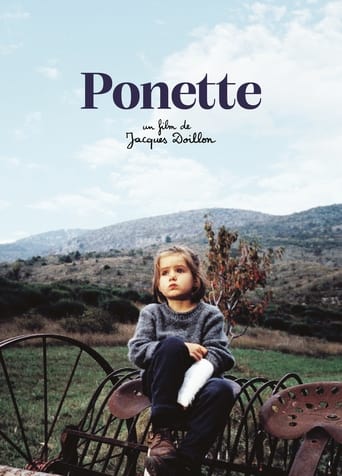Plustown
A lot of perfectly good film show their cards early, establish a unique premise and let the audience explore a topic at a leisurely pace, without much in terms of surprise. this film is not one of those films.
Kamila Bell
This is a coming of age storyline that you've seen in one form or another for decades. It takes a truly unique voice to make yet another one worth watching.
Michelle Ridley
The movie is wonderful and true, an act of love in all its contradictions and complexity
Zandra
The movie turns out to be a little better than the average. Starting from a romantic formula often seen in the cinema, it ends in the most predictable (and somewhat bland) way.
krocheav
This 1996 French film is reminiscent of an earlier French film from the 60s; Serge Bourguignon's "Sundays and Cybele", which also featured an astounding performance by a young girl, the remarkable Patricia Gozzi (Rapture '65)Director/Writer Jacques Doillon has achieved the almost impossible with this production, in fact it would seem as if the story was built around the talents of its remarkable young child star; four year old Victoire Thivisol. Very few four year olds could manage the intense work required to bring this story to life. The Director (and or Producer) has wisely gathered a crew of highly specialized technical professionals, who create the incredible illusion the viewer is following the lives of the characters as they unfold. Cinematographer: Caroline Champetier is known for her vivid Documentaries and features (Of Gods and Men '10 ~ Last Days in Jerusalem '11 ~ The Bear '88) Then, to piece the images together seamlessly, they chose Editor/Director: Jacquelne (Fano) Lecompte, known for her collaborations with documentary director Francois Bel. Both Bel and Lecompte won awards for their "Territory of Others" in 1970. When you also add to the above, Camera Operator/Director of Photography: Julien Hirsch (Korkoro '09) they made for a very solid collaborative team - all documentary trained filmmakers of renown.Some reviewers have quite reasonably drawn attention to the use of such a young cast for a highly emotional subject...dealing with the death of a beloved parent (in this case the girls own mother) This child has numerous harrowing scenes, including clawing at the earth of her mother's grave begging for her to "come back"! The method chosen for ending the film is good, but a little jarring...with the appearance of the girls mother! This could be taken as a child's imaginings, but these scenes are filled with very 'real' details - leaving the viewer unsure. Ponette's mother is played by Marie Trintignant, who just a few years later would sadly go to her own grave at only 41. With so many tears of tragedy needed throughout the entire story, it makes one wonder about the methods of prompting required to elicit so much from a four year old?The film makers and distributors must also have been concerned, as the video cover features an entire two page disclaimer - regarding managing the effects on the child star --written by a Psychologist--. Makes you wonder. Composer Philippe Sarde (Tess '79 ~ The Bear '88 ~ The Tenant '76) has written a sensitively expressive music score that's never intrusive. The adult characters in the early stages of the film can seem a little sketchy, with Ponette's father abandoning his grieving daughter by going away for an unexplained reason, leaving her in boarding school or with various relatives. Some of the scenes with her Auntie (and cousin's) do manage to achieve a level of interest and thoughtfulness.A beautiful film for those who like a special kind of story telling or love children. The Tartan VHS release is OK, but appears to be a rare find on DVD.
chattykathyp
I have wanted to see this movie for a very long time. At the time it was released, my own Mother had suddenly died and I knew that it would have been too intense for me to watch. Now, it is almost 11 years later and I have finally watched it and this is quite simply one of the most true to life portrayals of grief and the journey it becomes for really anyone. I was Ponettes age when my father died and I can completely relate to her reactions, her agony and the confusion she portrayed. I can remember asking constantly when Daddy was coming back and not really accepting the answers that people were telling me. I also recall praying and talking to my father when I was alone in my room, begging him to come back and see me when no one else was around. I even had a dream about my father that was amazingly close to Ponettes interaction with her mother. This rang so true for me that I couldn't believe the writer of this story connected things in such a realistic way. Victoire Thivisol is shockingly real in this role. I cannot believe she was only 4 years old when this was filmed! It's a fascinating study of a shields emotional response to such a tragic event and quite honestly, I am at a total loss of words as to how to describe the power of this movie. I can only tell you that if you are looking for something intense and engrossing, this would be your movie. I really appreciated the feeling it left me with at the end too.....that life is not always easy and predictable but that humans are remarkably resilient beings who can actually grow in wonderful ways from the events that challenge us the most.
Stanislas Lefort
This film recounts the grieving process of a four-year-old child who has lost her mother, the pain of the loss, of not finding answers, of not finding explanations of the unimaginable. It also shows how the people around the child experience are void. The children as well as the adults all try to offer an explanation. Seen like that, the film could seem awfully sad. But Ponette is also and especially a magnificent reflection on facing death in childhood, on the stages of grief, on all that is unexplainable. On this point, and rightly so, the end of the film should fuel a debate: did this really happen, or was this the product of Ponette's wild imagination? I think that, if we don't ponder this, we pass over one of the major elements of the work.
futures-1
"Ponette" (French, 1996): We learn that a child lost her mother in a car accident. Ponette (the child), like all children, tries to blend the various truths given her by adults, other children, teachers, books, rumors, churches...eventually arriving at her own version of Truth...a Truth that allows her to move on, with some peace. No one seems to know what to DO for her, and so, her search is solo. What most ASTOUNDS me about "Ponette" is: 1) It's written NOT by grown ups who see children as small adults, but as true children - with all the confusion, magic, and hope we seem to lose as we age, and, 2) the ACTING of Victoire Thivisol ("Ponette") is ABSOLUTELY AMAZING. She received numerous awards for this role, which upset some people - because she was only FOUR YEARS OLD at the time. "HOW CAN ANYONE HAVE TALENT AT FOUR?" Watch it for yourself. No one is beating her, no one is spraying lemon juice in her eyes, no one is tickling her feet...SHE is doing her own work. It's like she is channeling the next incarnation of Meryl Streep or someone. Since "Ponette", she has done two more films, including "Chocolat" (1999) with Juliette Binoche. She is now only TWELVE. I should live so long as to follow her entire career.

